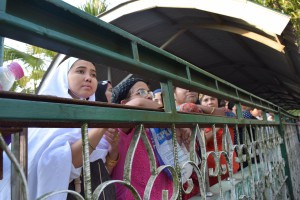Thousands flock to honour slain lawyer Ko Ni
Thousands of mourners gathered at a Muslim cemetery in Rangoon on Monday for the funeral of Ko Ni, a greatly respected lawyer whose murder has shocked the nation.
The 63-year-old lawyer and legal adviser to the government was gunned down at Rangoon International Airport on Sunday afternoon, after returning from a state-sponsored trip to Indonesia to study inter-communal peace efforts. Ko Ni was cradling his grandson in his arms when he was shot in the back of the head at point-blank range.
As a trusted aide to State Counsellor Aung San Suu Kyi and the National League for Democracy (NLD) government, he was instrumental in creating the state counsellor role for Suu Kyi, effectively bypassing the 2008 constitutional clause that bars her from the presidency to install her as Burma’s de facto leader.
This was the first high-profile assassination in recent years. Acts of violence against prominent political party members are extremely rare in Burma.
Police detained a 53-year-old suspect, Kyi Linn, shortly after the attack. A crowd gave chase immediately when the suspect attempted to flee the scene. Nay Win, a taxi driver at the airport, was killed by the gunman during the pursuit. He is survived by his wife and three children.
Reportedly jailed for smuggling Buddha heads and religious antiquities, it is alleged that murderer Kyi Linn was pardoned in a 2014 presidential amnesty under the Thein Sein administration.
Speaking to Reuters on Monday, Pol-Col Myo Thu Su said interrogation of the suspect had not yet yielded answers.
Neither President Htin Kyaw nor Suu Kyi attended the funeral at Yayway Cemetery, instead sending party veteran Tin Oo to represent the government.
In a statement released on Monday afternoon, the President’s Office speculated on the attacker’s intention.
“It is assumed, based on initial investigations, the murder was intended to harm the stability and tranquillity in the country. The government is continuing investigations to find the truth and is prioritising security measures based on the unfolding events.”
The President’s Office statement also advised citizens to be wary of racial or religiously motivated unrest.
Bertil Lintner, a long-time Burma expert and journalist, said Ko Ni was the country’s foremost constitution expert, and highlighted the threat he posed to the military.
“Security is very weak. U Ko Ni was a Muslim yes, but he was also the main advocate for constitutional reform, to limit the powers of the military, and that is what got him killed – not his religion,” he told DVB at the funeral.
Women watch on as Ko Ni was laid to rest on 30 January, 2016. (PHOTO: KIMBERLEY PHILLIPS / DVB)
Ko Ni’s murder comes as tensions between the Muslim-minority and the Buddhist majority rise. In northern Arakan State, tens of thousands of Rohingya have fled to neighbouring Bangladesh amid a “clearance operation” response to attacks on police outposts that claimed the lives of nine officers. Security forces have been accused of widespread human rights violations – something the government has denied.
Ko Ni was already working on a new Interfaith Harmony Bill, aimed at criminalising and discrimination.
An NLD member, speaking on condition of anonymity outside Ko Ni’s home, said he remembered him as a gracious and important man.
“It is a big loss for our country,” he said. “He was the one who was trying to help the Rohingya, to show the world what is happening. His passing, while the country is trying to go forward … it is very difficult for us now.”




